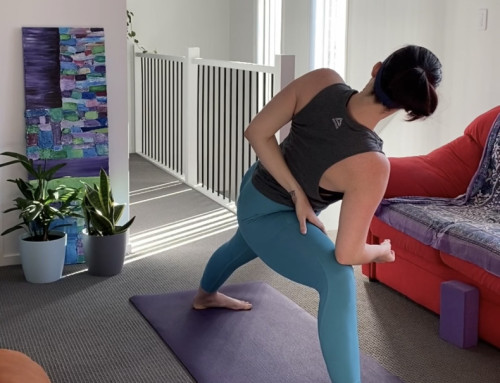Whether it’s in the workplace or in other areas of our lives, overwhelm can creep up at any stage when we feel busy. Sometimes it’s the feeling of a lot to do, a lot to process, or a place we’re working towards getting to. In any case, instead of constantly feeling at the mercy of overwhelm, practicing putting steps into place can help you start to manage the effects overwhelm can have on your system.
- Breathe – This may seem obvious, but it’s amazing how often we can forget to breathe properly or hold our breath when we’re trying to figure something out. Consider your last challenging yoga class or workout, and whether your teacher/trainer needed to remind you to breathe while you tried to manage just how to balance in that Warrior 3 to Eagle Pose transition. The same thing can happen in challenging moments off the mat as well. Whether you use an app to assist you, such as ‘BoxBreathing‘ (no affiliation on my part), or count your breath on your fingers, that old sage wisdom of taking 10 breaths before responding isn’t completely wrong, just maybe a little incomplete in the ‘why’. The pause between stimulus and response isn’t just to delay the inevitable reaction. It’s to get your autonomic nervous system (ANS) activated to help calm the release of stress hormones in your body, and THEN choosing how you’d like to respond from that place. So instead of focusing on putting off that reaction when you take those breaths, focus on the breaths themselves as much as you can and actually reassess on the other side of them.
- Ask more questions – If your stress is due to lack of information or misunderstanding (of a situation, person, or message), do step 1 and then move on to setting out to gain the information you need. Make a list of questions you need answered and start seeking. Remember the power is in doing what you can. If the answers aren’t ready or available, move on to step 3.
- Control the controllables – This is a phrase that some of my closest friends and I use in our group chats sometimes to remind ourselves and each other that we’re simply doing the best we can, surrendering the effort on the rest, and that is perfect. There is a lot in our lives we can control and influence, and should refuse to hold back and play small, in the pursuit of creating the life we desire. There comes a point, however, where we need to simply surrender. Maybe we’ve done all we can on our end and are waiting for a response, about a job, proposition, agreement of some sort, or we’ve attained all the possible information available to us and simply have to get on with the job with what we’ve got. Whichever way, the mantra of “control the controllables” can help to remind you what you can focus on, and help to surrender that tight grip over what isn’t up to you in this particular moment. We may not love it all the time, but it gives us a more practical way to step out of the emotive state of overwhelm and ease the pressure we feel in it.
Of course, in the moment of overwhelm the last thing we tend to remember are the steps that are helpful. The trick to helping yourself remember these more in the moments you need them, and not just outside of the stress, is to practice them. You don’t need to feel that overwhelm to practice breathing, getting more information, and the mindset shift of what you can and cannot control. All of these serve you in any moment, in any level of stress state.
Article originally published on Thrive Global.






